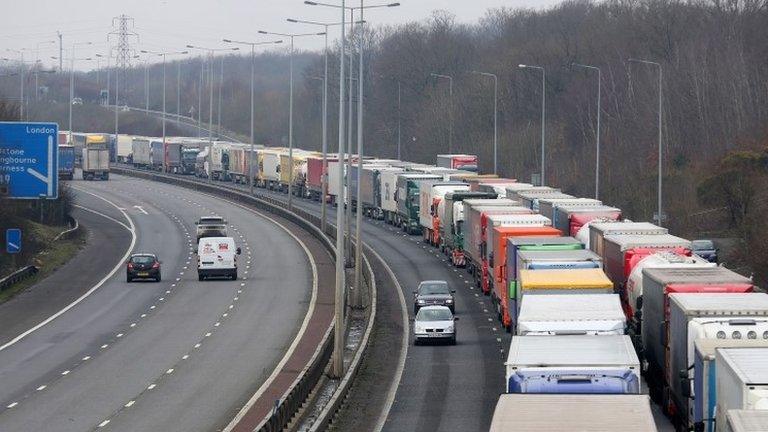How do you solve a problem like Operation Stack?
- Published
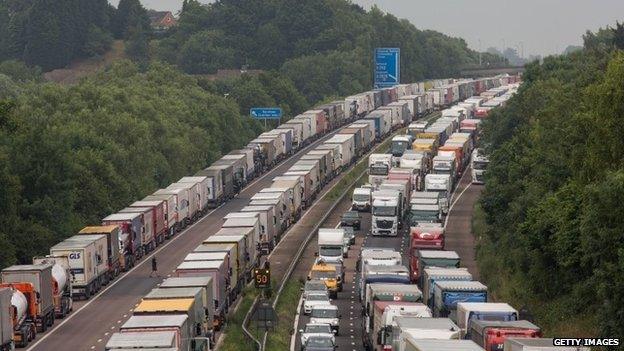
Queues of 4,600 lorries stretched back 30 miles
With cross-Channel disruption set to continue through the summer as French ferry workers strike, calls are mounting for solutions to be found to the traffic gridlock that hits Kent as a result - but how do you solve a problem like Operation Stack?
Operation Stack is the name given to a queuing system where lorries waiting to cross the Channel park on closed sections of the M20.
Last week, it reached unprecedented levels when Stack was extended to phase four for the first time in its history - residents nearby reported "absolute bedlam".
Queues of 4,600 lorries stretched back 30 miles, the daily cost to the UK economy was estimated at £250m, and emergency teams handed out more than 18,000 bottles of water to truckers stranded during a heatwave.
It followed strike action in France by MyFerryLink workers who closed the Port of Calais.
And Stack was again brought in days later after about 150 migrants tried to storm the Channel Tunnel in a bid to board UK-bound freight trains.
But problems are not only caused by strikes and migrants - Stack is also a regular occurrence during winter months when storms and high winds hit the Channel and disrupt sailings.
For years, there have been calls to find an alternative solution, amid complaints about the impact of traffic disruption on Kent's businesses and residents - from commuters and traders to parents on the school run.
So how do you solve a problem like Operation Stack?
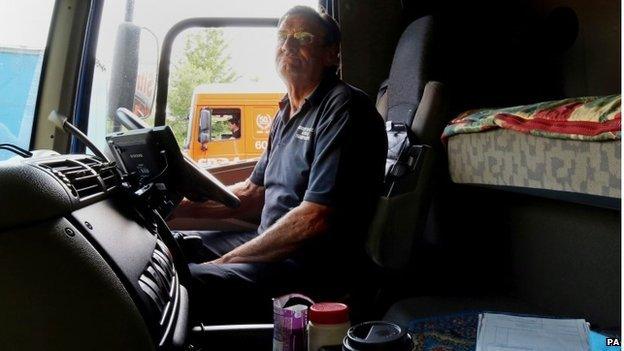
Most drivers have provisions to last for the first 18 to 24 hours
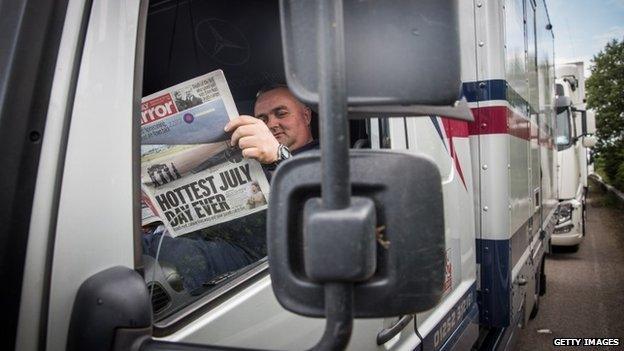
Some drivers had waits of more than 24 hours last week
'Super ferry port needed'
Firstly, not everyone believes Stack is a problem.
Pat Fleming, from Galway City, west Ireland, a driver who waited for 26 hours to cross the Channel, said it was part of his job and just "one of those things".
He said Operation Stack worked as long as it was properly policed and added: "It's not a big issue. It doesn't happen that often. The last time was during bad weather in February."
Alan Overton, from Grimsby, who waited on the M20 for 33 hours to cross to France said he believed there was no way of preventing Stack, unless operations were completely moved from Dover to a "super ferry port" that could hold 6,000 vehicles and was built away from towns.
Both drivers agreed facilities provided during Stack could be better.
Out of the two, only Mr Overton ran out of supplies and needed the fruit and water handed out by emergency teams - but both drivers said the toilet facilities - portable loos put up at intervals along the closed motorway - were "absolutely disgusting".
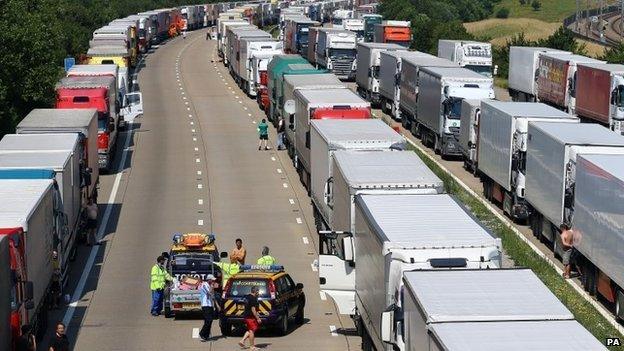
Coastguards handed out water to drivers stranded in a heatwave
Kent 'shut for days'
Matt Clarke, manager at Castledene Transport which has a fleet of lorries in Aylesford, said his fleet was left unable to access the M20, and the firm needed to use the motorway 24 hours a day.
He said the media focus on the Calais strikes meant no-one noticed Kent was "shut for days".
Stack hit the headlines last week because of the French strikes and migrant activity, but Kent dealt with the problem more often than anyone thought, he added.
Calling for a lorry park to "take the sting out of Stack", he asked asked how hard it was to "build a field and put some concrete on it".
Suggestions on how to cope with cross-Channel disruption have come from hauliers, ferry operators, politicians and residents.
Ferry operator P&O called on the British and French authorities to keep Calais open.
And in the case of the migrants, the UK and France agreed to increase funds to improve security at the port and tunnel.
The UK's Road Haulage Association called for the military to be deployed to break up the French strike. Chief executive Richard Burnett said the "time for talking" had passed.
And Dan Cook, operations director of Europa Worldwide Group, a transport, distribution and logistics firm, said the fundamental problem was there was no sign of active policing in Calais.
Dover MP Charlie Elphicke said the problems underlined the need to consider expanding the port at Dunkirk, 45 miles from Calais.
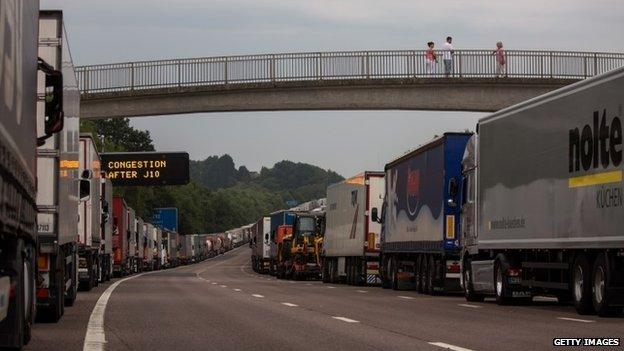
The trucks queue on the hard shoulder and fast lane
Meanwhile, Kent residents in Hollingbourne village, close by the M20, said people should have the right to sue French strikers in European courts for delays, inconveniences and wasted goods.
Resident Chris Childs reported seeing 40 lorries drive through the village in 15 minutes to avoid the queues.
He also said the journey time from Tonbridge to Hollingbourne - normally a 35-minute drive of 22 miles - increased to nearly two hours.
'More strikes likely'
Helen Whately, MP for Faversham and mid-Kent, described the impact on her constituents as "incredibly inconvenient".
She said: "People taking their children to school have long delays, and people getting to work - commuters - it's a nightmare. And it really seriously affects businesses."
Calling for alternatives to Stack, she added: "We know there are going to be more strikes likely during the summer and ongoing."
She said short-term solutions needed to include better communications about delays to haulage companies so drivers could potentially postpone their journeys, and she said pressure must be placed on the French government to ensure as many routes as possible were kept running.
But she also backed plans for lorry parks to be provided.
Plans have already been put forward for a 3,300-space lorry park - although the size of the scheme has been criticised with calls for a smaller facility that would take up to a thousand vehicles.
A report by Kent County Council in conjunction with Kent Police and Highways England is to be published soon, she said.
The Port of Dover has said last week's events will have shattered any illusion their operation is a quaint little port doing ferry trips for holidaymakers and booze cruisers.
But the port has also warned a very busy summer is rapidly approaching - and ferry companies have highlighted their concerns that routes stay open as the holiday season gets under way.
- Published4 July 2015

- Published2 July 2015
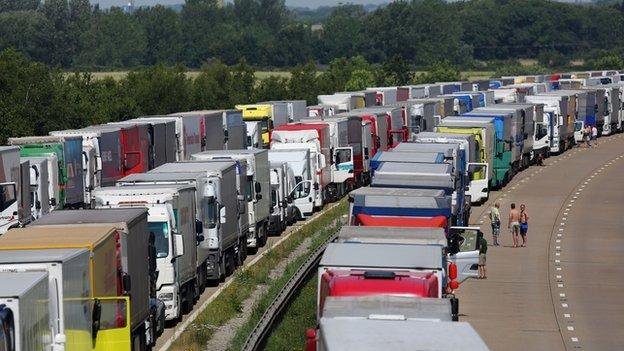
- Published1 July 2015

- Published12 March 2015
